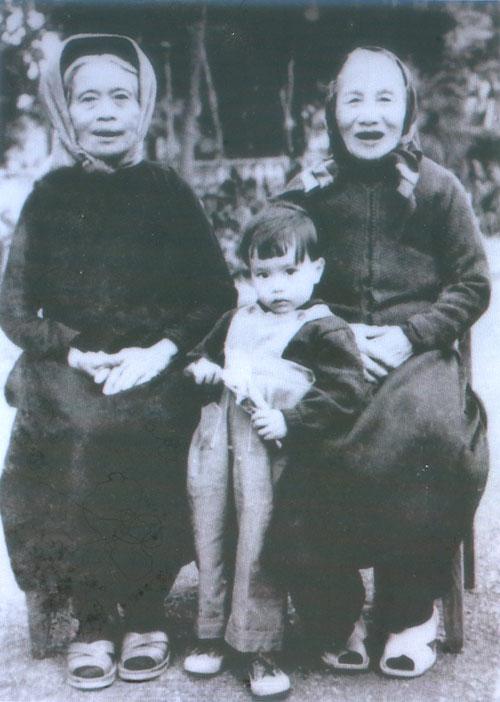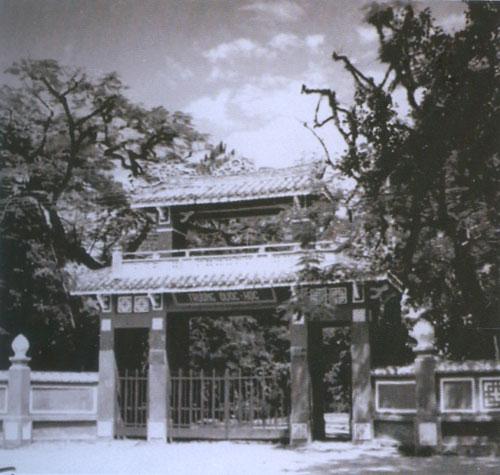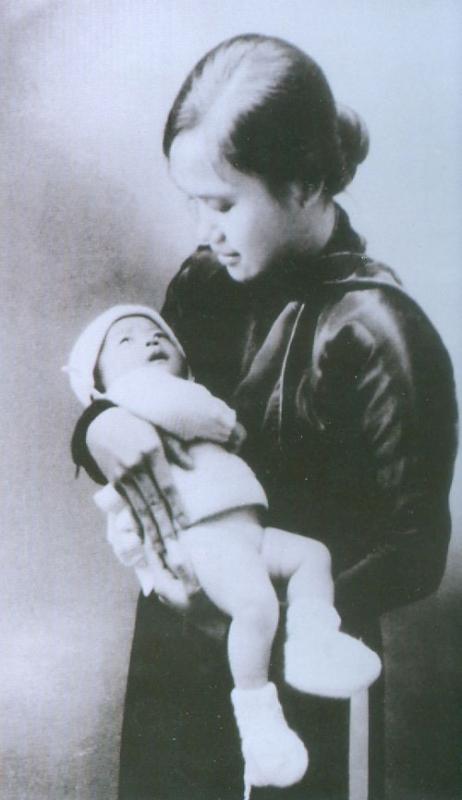Chi tiết tin - Quảng Bình (Tiếng Anh)
Hometown, youth and revolution
At 17, Vo Nguyen Giap was admitted to the Tan Viet Party, one of the predecessors to the Communist Party of Viet Nam. He operated in a small secret group of the Party in Hue. He wrote for newspapers to introduce Marxism. After the Soviet-Nghe Tinh uprising, in October 1930, Vo Nguyen Giap was arrested along with others, and sentenced to two years in prison. In late 1931, he was freed.
He left for Vinh, and then went to Ha Noi. In 1932, he passed the first Tu Tai (high school) exam. He then taught in Thang Long School, which educated many students who later became revolutionary leaders. In 1933, Giap passed the full Tu Tai exam and was admitted to Albert Sarraut School. In 1935, he graduated with a Bachelor’s degree in Law and Economics. During this time, he fell in love with Quang Thai, a girl he had a crush on since his days in Hue. She was the younger sister of the revolutionary, Nguyen Thi Minh Khai. They were married that same year.
In 1936, Vo Nguyen Giap joined many resistances and wrote for several legal newspapers of the Party, was one of the founders of the Indochinese Democratic Front Movement, and President of the Executive Committee for the Bac Ky (Tonkin, the North) Press Association.
In May 1940, the Party sent Vo Nguyen Giap and Pham Van Dong abroad.
Hometown
Quang Binh is a historic place. In 1306, Princess Huyen Tran left for her marriage life in the Kingdom of Champa. This arranged marriage resulted in an expansion of the land border in the South with Chau O and Chau Ly. Quang Binh belongs to Chau O. Quang Binh was the division line as the country was separated into Dang Trong and Dang Ngoai under the conflicts between the Trinh and the Nguyen lords. In modern history, Quang Binh housed many resistance zones against the French in the Can Vuong Royalist Movement. In the Resistance against the French, various exemplary people had reignited the indomitably fighting traditions of the Quang Binh people: Xuan Bo and Hero Lam Uy, Cu Nam revolutionary village, heroic village Canh Duong. In the anti-American Resistance war for National Salvation, notable names are the Nhat Le River and Heroic Mother Suot. An Xa Village, a land of sweet fruits, beautiful flowers, and the Kien Giang river was associated with Giap’s childhood.
 |
|
Kien Giang, the river that flows through Giap’s childhood home and memories. |
 |
|
Vo Nguyen Giap with his parents, daughter Hong Anh (in white blouse) and nieces, 1946 |
|
|
|
The house of Vo Nguyen Giap’s parents: Vo Quang Nghiem and Nguyen Thi Kien, in An Xa village, Le Thuy district, Quang Binh province where Giap first saw the light of day |
|
|
|
Vo Quang Nghiem, Vo Nguyen Giap’s father |
|
|
|
Nguyen Thi Kien, Vo Nguyen Giap’s mother |
 |
|
Dau Thi Thu (left) mother of martyr Nguyen Thi Quang Thai, and Nguyen Thi Kien (right), mother of Vo Nguyen Giap |
 |
|
The family ancestral altar |
Youth and revolution
Despite being an excellent student at the Quoc Hoc School in Hue, studying was not Vo Nguyen Giap only interest when the resistance movements of peasants, intellectuals, and students in the Trung Ki (Annam) broke out. These activities dealt with decreasing tax burden, demanding freedom for Phan Boi Chau, a revolutionary, and wearing mourning bands for the patriot Phan Chu Trinh. Vo Nguyen Giap was quickly engaged in these activities. As such, Vo Nguyen Giap had various friends who operated in the patriot movements such as Nguyen Khoa Van (Hai Trieu), Nguyen Thuc Hao, etc., especially Nguyen Chi Dieu, three years older than Giap. Dieu was also a poor student and had the same ambitions as Giap. After only three years of knowing each other, Nguyen Chi Dieu suggested Vo Nguyen Giap to join the Tan Viet Revolutionary Party. Moreover, in Hue, Giap was taught by many devoted teachers such as Vo Liem Son, Cao Xuan Huy, and Dang Thai Mai.
 |
|
The gate of Quoc Hoc School in Hue where Vo Nguyen Giap studied and was expelled for leading a student strike (1924-1927) |
|
|
|
Nguyen Chi Dieu, the friend who suggested Vo Nguyen Giap follow the revolutionary path and later to join the Tan Viet Revolutionary Party |
|
|
|
Nguyen Khoa Van (Hai Trieu), the friend who had the same ambitions as Vo Nguyen Giap and actively joined the revolutionary movements of the students of Quoc Hoc School in Hue. |
 |
|
Vo Nguyen Giap was arrested and sentenced to three years at the Thua Phu prison in Hue on October 25, 1930 for joining a student strike in Hue and writing for the Tieng Dan (the People’s Voice) newspaper to spread Marxism |
After being expelled from Quoc Hoc School in Hue, Vo Nguyen Giap returned home for a while and then went back to Hue to write for the Tieng Dan (the People’s Voice) newspaper. Huynh Thuc Khang was the Editor-in-chief. One of the first articles was "Vu tru va tan hoa" (The Universe and Enlightenment), #218 edition (September 28, 1929) and #222 edition (October 10, 1929) under the pseudonyms Hai Thanh.
|
|
|
Vo Nguyen Giap’s photo during the time working for the Tieng Dan (People’s Voice) newspaper in Hue |
|
|
|
After being freed with Vo Nguyen Giap, Vo Nguyen Giap’s former teacher Dang Thai Mai returned to Vinh. Vo Nguyen Giap was escorted to his hometown. Later, he went to Vinh, Nghe An. In 1932, Dang Thai Mai went to Ha Noi to teach. Vo Nguyen Giap followed him there. |
 |
|
The Thang Long School in Ha Noi. Hoang Minh Giam was the principal. Vo Nguyen Giap taught history. He also wrote for "Le Travail" and "Notre Voix" newspapers |
 |
|
Vo Nguyen Giap during the time he taught at Thang Long School in Ha Noi |
 |
|
Vo Nguyen Giap participating in a party for patriot revolutionaries at Lac Xuan Hotel in Hang Bong street, Ha Noi 1938 |
 |
|
Vo Nguyen Giap taught history at Thang Long School in Ha Noi, where Hoang Minh Giam was principal (1932-1939). There, Vo Nguyen Giap taught and wrote for "Le Travail" and "Notre Voix" Newspapers |
|
|
|
A portrait of Hoang Van Thu, Standing Member of the Indochinese Communist Party Executive Committee |
Following the advice of Hoang Van Thu, at Co Ngu Street, in summer 1940, Vo Nguyen Giap parted with his wife Nguyen Thi Quang Thai, and his newly born daughter, Hong Anh, to leave for China to meet Nguyen Ai Quoc. Thai promised to leave for revolutionary activities when their daughter was a little older. They would never know that it was indeed a goodbye for good.
 |
|
At Co Ngu (present day Thanh Nien) street, in 1940, Vo Nguyen Giap parted with his wife Quang Thai |
 |
|
Vo Nguyen Giap and his wife, Nguyen Thi Quang Thai, during their happy days in Ha Noi |
 |
|
Nguyen Thi Quang Thai and Hong Anh, less than 1 year old, parting with her father |
 |
|
Nguyen Thi Quang Thai, younger sister of revolutionary martyr Nguyen Thi Minh Khai, before her imprisonment by French colonialists |
|
|
|
Nguyen Thi Quang Thai was detained in Hoa Lo prison in Ha Noi by the French colonialists and sacrificed her life there |
Source: "Commander-in-chief General Vo Nguyen Giap" Book
- General Vo Nguyen Giap's devotion to science-technology, culture and art (19/10/2013)
- An exemplary man (19/10/2013)
- The book “Dien Bien Phu: five miracles never seen before in history of war” in Egyptian (17/10/2013)
- Palestinian newspaper carries book on Dien Bien Phu battle (17/10/2013)
- Contributions of General Vo Nguyen Giap highlighted (17/10/2013)
- A passenger through the century (15/10/2013)
- General Giap - an unfailing light for Vietnamese people (11/10/2013)
- General Phung Quang Thanh and General Vo Nguyen Giap (11/10/2013)
- Condolences over General Giap’s passing keep pouring in (11/10/2013)
- Rare documents on General Vo Nguyen Giap showcased (11/10/2013)












